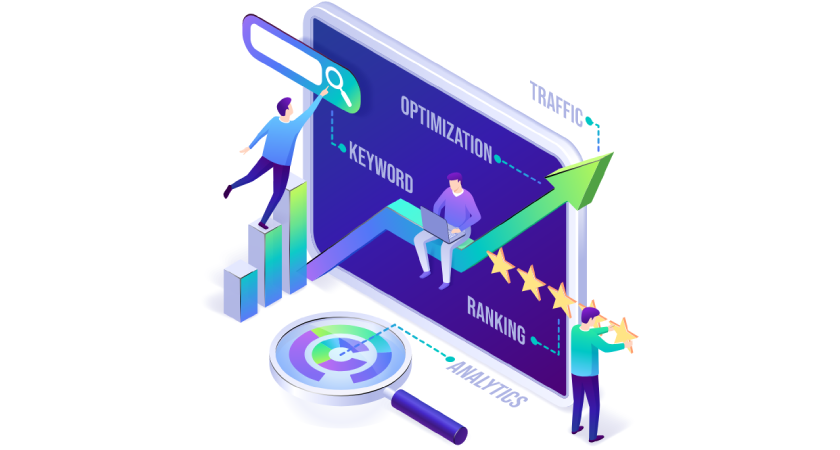TLDR: Yes. A thousand times yes!
If you want to maximize the traffic coming to your website, and at the same time capitalize on the highest converting form of traffic, then SEO is crucial for your ecommerce business. Search Engine Optimization (SEO) is the practice of optimizing your website to rank higher in search engine results pages (SERPs), making it easier for potential customers to find your products and services. For ecommerce websites, SEO can be a game-changer, driving increased organic traffic, brand awareness, and ultimately, sales.
The Value of SEO for Ecommerce
According to recent studies, a significant portion of ecommerce traffic comes from search engines, with some estimates suggesting that organic search drives as much as 51% of website traffic for ecommerce brands. Furthermore, SEO has consistently been ranked as one of the highest ROI marketing strategies for ecommerce companies, outperforming many other digital marketing channels.
The impact of SEO on ecommerce sales is undeniable. A study by Semetric found that websites ranking in the top three positions in Google’s search results received nearly 40% of all clicks, while the top result alone captured over 28% of clicks. This highlights the immense value of securing a top spot in search results for relevant keywords.
| Ranking Position | % of Clicks |
| 1 | 28.5% |
| 2 | 15.7% |
| 3 | 11% |
Additionally, SEO offers several key advantages for ecommerce businesses:
1. Increased Organic Traffic and Visibility: By optimizing your website’s content, structure, and technical elements, you can improve your search engine rankings for relevant keywords, making it easier for potential customers to find your products or services.
2. Higher Conversion Rates and Sales: Organic traffic from search engines tends to be more targeted and engaged, resulting in higher conversion rates and increased sales for your ecommerce store.
3. Cost-Effective Marketing Channel: Unlike paid advertising, which can be expensive and has a limited lifespan, SEO is a long-term investment that can continue to drive traffic and sales for years to come, making it a cost-effective marketing strategy.
4. Improved User Experience and Brand Credibility: A well-optimized ecommerce website not only improves the user experience by providing relevant and valuable content but also enhances your brand’s credibility and authority in your industry.
Key SEO Strategies for Ecommerce
On-Page SEO
On-page SEO refers to the optimization of individual web pages to improve their relevance and visibility for specific keywords. For ecommerce websites, this includes optimizing product pages, category pages, and other content by integrating relevant keywords into titles, meta descriptions, headings, and body content. However, it’s crucial to strike a balance between keyword optimization and creating unique, high-quality content that provides value to your customers.
Technical SEO
Technical SEO focuses on optimizing the behind-the-scenes elements of your website to ensure it’s search engine-friendly. This includes factors like site architecture, page speed, mobile-friendliness, and indexability. A well-structured and optimized website can significantly improve your search engine rankings and user experience. Tools like Google Search Console can help you identify and fix technical issues, ensuring your ecommerce site is fully optimized for search engines.
Off-Page SEO
Off-page SEO encompasses strategies aimed at building authority and credibility for your website in the eyes of search engines. One of the most important off-page SEO tactics is link building, which involves acquiring high-quality backlinks from other reputable websites. This can be achieved through content marketing, influencer outreach, and other link-building strategies.
Getting Started with Ecommerce SEO
To begin your ecommerce SEO journey, the first step is to conduct thorough keyword research. Identify the relevant, high-intent keywords that your target audience is searching for, and use these keywords to optimize your website’s content and structure. Additionally, it’s recommended to perform an SEO audit to identify areas for improvement, such as technical issues, content gaps, or opportunities for optimization.
While it’s possible to tackle SEO in-house, many ecommerce businesses choose to partner with experienced SEO experts or agencies. These professionals can provide valuable guidance, resources, and expertise to help you develop and implement an effective SEO strategy tailored to your business goals.
Real-World Examples and Case Studies
To illustrate the power of SEO for ecommerce, let’s look at some real-world examples and case studies:
Example 1: Beardbrand, a men’s grooming and lifestyle brand, saw a 242% increase in organic traffic and a 99% increase in revenue after implementing a comprehensive SEO strategy, including keyword research, content optimization, and link building.
Example 2: Asos, a popular online fashion retailer, reported that organic search accounts for a significant portion of their overall traffic and revenue, thanks to their focus on SEO best practices and a user-friendly website experience.
These examples demonstrate that when executed effectively, SEO can drive substantial growth and profitability for ecommerce businesses.
Expert Opinions and Recommendations
Don’t just take our word for it. Renowned SEO experts and industry professionals have also weighed in on the importance of SEO for ecommerce:
“SEO is the foundation of any successful ecommerce business. It not only drives targeted traffic to your site but also helps establish your brand as a credible and authoritative player in your industry.”
– Rand Fishkin, Co-founder of Moz and Sparktoro.
“In the ecommerce space, SEO is more than just a marketing tactic – it’s a crucial component of your overall business strategy. Neglecting SEO can be detrimental to your online visibility and sales.”
– Lily Ray, SEO Consultant and Director of SEO at Path Interactive.
To maximize the impact of your ecommerce SEO efforts, industry experts recommend:
– Conducting thorough keyword research and continuously monitoring search trends
– Creating high-quality, engaging, and informative content that addresses customer pain points and queries
– Prioritizing technical SEO elements like site speed, mobile-friendliness, and structured data markup
– Building a diverse backlink profile through various link-building tactics, such as content marketing, outreach, and building industry connections
So, is SEO worth it for ecommerce? Hopefully it’s now more clear than ever… SEO is undoubtedly worth the investment for ecommerce businesses. By optimizing your website for search engines, you can increase your online visibility, drive targeted traffic, boost conversions, and ultimately grow your sales and revenue. However, it’s important to approach ecommerce SEO as a long-term strategy, as it requires consistent effort, patience, and a willingness to adapt to the ever-evolving search landscape.
If you’re serious about taking your ecommerce business to new heights, it’s time to prioritize SEO. Whether you choose to tackle it in-house or seek the expertise of a professional SEO agency, investing in a well-executed and consistent SEO strategy can be the key to unlocking sustainable growth and success in the highly competitive ecommerce arena.


